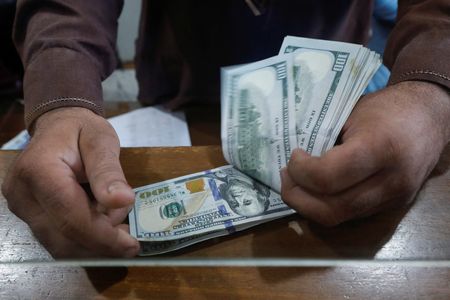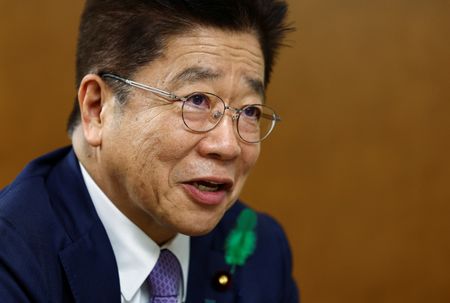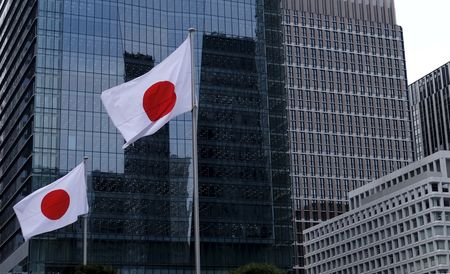By Andrea Shalal and Karin Strohecker
WASHINGTON (Reuters) -Top U.S. and Chinese officials joined a meeting on Wednesday of the Global Sovereign Debt Roundtable, where a key topic was the lack of transparency about commercial bank loans that have complicated developing countries’ debt restructuring efforts.
The International Monetary Fund, World Bank and current G20 president South Africa issued a progress report after the meeting, calling for continued efforts to address elevated debt vulnerabilities, particularly in low-income countries.
It said debt levels in low-income countries and emerging economies had generally stabilized, but remained higher than during the pre-COVID-19 era, with a few being particularly vulnerable. Many also faced elevated debt-service challenges, crowding out spending on education, health and infrastructure.
“Recent shifts in global policies and cuts in foreign aid add to the challenges,” the report said, underscoring the need for domestic reforms by debtor countries to boost growth, with specific attention to rising domestic debt vulnerabilities.
Participants agreed to keep working to improve debt restructuring processes, including looking for ways to accelerate the restructuring of non-bonded commercial debt, accelerating support to countries with sustainable debt but high debt-service challenges, and strengthening transparency.
IMF strategy chief Ceyla Pazarbasioglu said the continued participation of the U.S. and China in the roundtable, despite a fierce trade war dividing the world’s two largest economies, showed their commitment to keep addressing the high debt levels hurting developing countries.
The roundtable, which met during the annual meetings of the IMF and the World Bank in Washington, had led to progress in shortening the timelines of official debt restructurings and reworking bonded debt, but there was more work to do on non-bonded debt, Pazarbasioglu told reporters before the meeting.
“These discussions have been important to get everyone on the same page,” she said. “The fact that tomorrow we will have the U.S. Treasury Secretary (Scott Bessent) there, China will be there, and others will be there, is a sign that they are still committed to this discussion.”
CALL FOR TRANSPARENCY OVER DEBT
The progress report showed that transparency was a shared concern, especially regarding non-bonded debt.
“Non-bonded debt is the laggard at this point,” Pazarbasioglu said, noting some countries had moved through a restructuring but still faced bank exposures or other loans that prevented credit ratings agencies from removing their default status and raising ratings.
“This is a critical step to make sure that countries are able to access lower cost financing. So that’s what we are really focusing on now,” she said.
A recent IMF paper detailed the challenges faced by such countries – including Ghana, Sri Lanka, Zambia and Suriname.
The report cited broad support for earlier and more comprehensive publication by official creditor committees of the key terms of restructurings – including the net present value reduction – once an agreement was reached, though full consensus had not yet been reached.
Participants also broadly supported extending to all G20 creditors the World Bank’s “Debt Data Sharing Exercise,” which ensures the data of debtors and creditors are reconciled.
Many of them expressed strong interest in the World Bank’s proposal for a digital platform to automate loan data reconciliation, building on a pilot program launched with Indonesia, it said.
Negotiators continue to work on a declaration on debt issues that the Group of 20 major economies, which launched the Common Framework for debt restructurings during the COVID-19 pandemic, hopes to issue on Thursday, participants said.
GLOBAL DEBT AT RECORD LEVELS
Global debt is at record levels, but many emerging markets have actually reduced their debt-to-GDP ratios, although they still face crushing debt service payments and have been crowded out of the capital market by advanced economies.
Liquidity is a bigger concern now than solvency, Pazarbasioglu said.
Debt experts say high borrowing costs on international capital markets have effectively shut out many riskier borrowers, pushing governments to opt for loans where terms and conditions are rarely published.
Jose Vinals, former group chairman of Standard Chartered, one of the two private-sector creditors together with BlackRock that are part of the global sovereign debt roundtable, said more transparency was clearly needed.
“This is something that complicates enormously the restructuring processes and I think one of the things where progress needs to be made,” he said during an event hosted by the Bretton Woods Committee late on Tuesday.
Loans lack mechanisms such as collective action clauses often written into bonds that help to streamline sovereign debt restructurings by allowing a majority of bondholders to bind the minority to a new deal and prevent “holdout” creditors.
He also pointed to working groups such as the London Coalition on Sustainable Sovereign Debt, launched in June by the British government to help make contracts clearer and more transparent, as improving the way loan terms address natural disasters, and addressing problems with group lending practices.
Almost all international bond and loan contracts across emerging markets use England and New York as jurisdictions.
(Reporting by Andrea Shalal and Karin Strohecker; Editing by Frances Kerry and Paul Simao)












